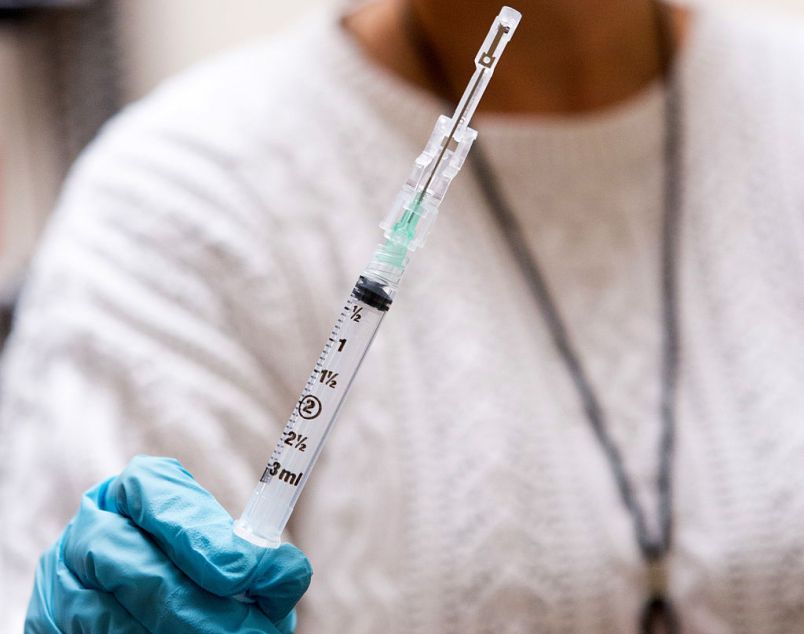President Trump’s pressure campaign to get the Food and Drug Administration to approve a vaccine before Election Day has likely already damaged public confidence in what may be the most effective tool to fight COVID-19, epidemiologists say.
“This is incredibly reckless and shows a lack of understanding of the consequences of talking this way,” said Gary Slutkin, a former WHO epidemiologist who fought outbreaks in Africa.
Slutkin added that there is no reason to doubt that the vaccine trials themselves are going well. Rather, he said, the messaging around the vaccine from the White House — tying it explicitly to political objectives — would likely sow doubt in its use among those who would normally want to be vaccinated, and further fan the flames of denial among those who think all vaccines are unsafe.
“The trials that are ongoing are being, as far as I and my colleagues are concerned, done very well, and the results should be trusted,” Slutkin said. “But the issue is that now, people who will want to get it under normal circumstances might distrust it.”
President Trump has said that he wants a vaccine approved before the election, and tweeted Sunday that “the deep state, or whoever, over at the FDA is making it very difficult for drug companies to get people in order to test the vaccines and therapeutics. Obviously, they are hoping to delay the answer until after November 3rd.” He tagged his FDA commissioner, Stephen Hahn, in the tweet.
White House Chief of Staff Mark Meadows later told ABC’s George Stephanopoulos that the tweet was Trump’s way of making the FDA “feel the heat.”
The deep state, or whoever, over at the FDA is making it very difficult for drug companies to get people in order to test the vaccines and therapeutics. Obviously, they are hoping to delay the answer until after November 3rd. Must focus on speed, and saving lives! @SteveFDA
— Donald J. Trump (@realDonaldTrump) August 22, 2020
Separately, on Sunday the FDA issued an emergency use authorization for convalescent plasma to treat COVID-19, though some experts said more data was needed. And the FT reported that the Trump administration was mulling whether to skirt U.S. regulatory standards to issue an emergency approval for a potential vaccine before still-ongoing trials are complete.
The situation comes days after top FDA vaccine official Dr. Peter Marks said that he would resign if the FDA were pressured into approving a vaccine that was ineffective or unsafe.
Rushing to release a vaccine before clinical trials concluded could “undermine confidence” not only in COVID-19 vaccines, but “our entire vaccine supply,” Dr. Peter Hotez, professor of Tropical Medicine at Baylor, said on CNN Monday.
“If you try to release the vaccine head of that time, say with only a few thousand [people tested], you could start seeing safety problems after you’re starting to immunize large numbers of individuals,” Dr. Hotez said. “Things could go wrong quickly if we try to rush this.”
Two vaccines are currently undergoing phase three trials, which test the efficacy and safety of the vaccine candidates in pools of 30,000 people each. The trials administer the test vaccine and placebos to the group; once enough data is gathered on whether the vaccine protects people without hurting them, it goes on to submission for licensing.
But federal law allows the FDA to issue emergency use authorizations for treatments that are not fully tested but could prove effective in fighting an illness.
Trump’s pressure on the FDA — even if unsuccessful — stokes confusion in what processes typically ensure vaccine safety and efficacy, Slutkin, the former WHO epidemiologist, told TPM.
“There shouldn’t be too much confusion among the experts as to how much efficacy and safety is expected,” Slutkin said. “The whole process on drugs and vaccines is very well-laid out, but the public doesn’t know it so well. So it’s reckless confusion.”
Ultimately, any COVID-19 vaccine would likely be approved by emergency use authorization, Deputy Director of the FDA’s Division of Vaccines Dr. Doran Fink said at a July 26 hearing of the CDC’s vaccine committee.
Dr. Fink outlined a scenario for the COVID-19 vaccine where the huge preponderance of cases in some areas could “rapidly prove efficacy, but not safety.” More time would be needed for that.
He added that the COVID-19 vaccine trials “could rapidly accrue enough cases” to hit the criteria for effectiveness without enough data for the FDA to know what risk it would be taking in approving the vaccine.
The issue then, Dr. Fink explained, would be ascertaining the safety of the vaccine. The issue for regulators, he added, is that the wide use of a COVID-19 vaccine likely means the safety standard for an emergency use approval would be far closer to the standard needed for normal licensure — a process that typically takes years.
“If you’re talking about a vaccine that’s intended to be used in tens to hundreds of millions of individuals who are not infected at the time they’re vaccinated, and there are much more limited safety data available for that vaccine and some additional uncertainties and risks, then the may-be-effective standard gets much closer to the type of evidence that we would need to support licensure,” Fink said.



